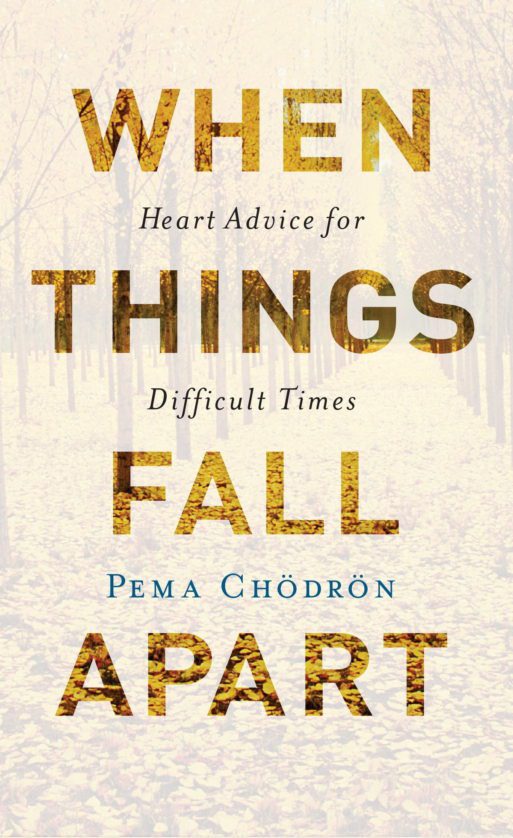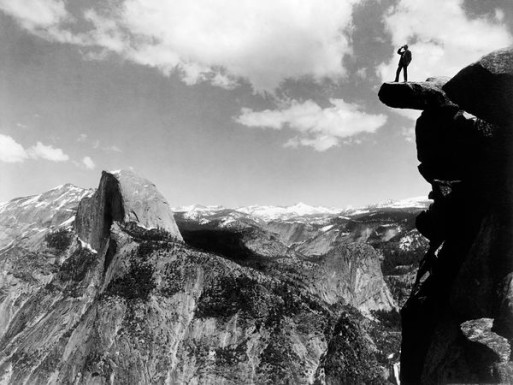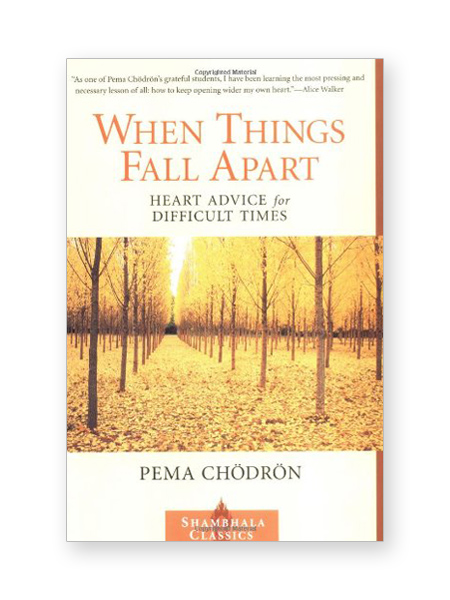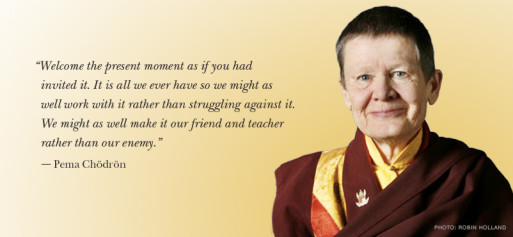 Pema Chödrön was born in 1936 in New York City, and received full monastic ordination in the Chinese lineage of Buddhism in 1981. She is currently the director of Gampo Abbey in Nova Scotia, Canada, where she has served and taught since 1984. She has lectured and written extensively on Buddhist teachings for a predominantly Western audience, and is beloved for her compassionate, direct and fearless perspective. However, Chödrön asserts, it is not fearlessness, but becoming acquainted with the dimensions of fear that forms a solid foundation for encountering the fundamental groundlessness and uncertainty of life.
Pema Chödrön was born in 1936 in New York City, and received full monastic ordination in the Chinese lineage of Buddhism in 1981. She is currently the director of Gampo Abbey in Nova Scotia, Canada, where she has served and taught since 1984. She has lectured and written extensively on Buddhist teachings for a predominantly Western audience, and is beloved for her compassionate, direct and fearless perspective. However, Chödrön asserts, it is not fearlessness, but becoming acquainted with the dimensions of fear that forms a solid foundation for encountering the fundamental groundlessness and uncertainty of life.

Credit: nationalgeographic.com
“When Things Fall Apart: Heart Advice for Difficult Times” is a collection of lectures that Chödron gave from 1987-1994, focusing on concepts that anyone can use to navigate groundlessness — those times of transition when one feels like everything solid and familiar has suddenly disappeared, including one’s sense of self and purpose. The fear that arises from this experience is the main focus of the book.
“If we’re willing to give up hope that insecurity and pain can be exterminated, then we can have the courage to relax with the groundlessness of our situation. This is the first step on the path.” In other words, Chödrön asserts that insecurity and pain are inevitable parts of the human experience, and to relax with this truth — to not resist it — creates a fundamental awareness of self. To not run from discomfort, but rather to be curious about it, is the first step. To this purpose, Chödrön discusses why this perspective is necessary for sane living, as well as some techniques to help foster it.

Credit: pemachodronfoundation.org
Encountering fear with curiosity begins with understanding why fear comes up in the first place. It is a response to change or transition. The nature of the universe is that it is constantly in flux, changing from one form to another. The food we eat is changed into our physical body, which is a metaphor for how death feeds life in a constant cycle of renewal. From the human perspective, we cannot know how change will affect our lives (or not), and this uncertainty triggers a survival response. We run away, close ourselves off, shut down, and become one with our fears.
Chödrön relates the story of a friend of hers who is dying from AIDS. He used to hate his condition, but has now come to the realization that it has made him live more presently, vividly, and in gratitude than he ever did when he was healthy. He shared, “Now every moment is so precious to me. All the people in my life are so precious to me. My whole life means so much to me.”
It is not about whether we live or die in the long term. Rather, it is how we encounter ourselves in each moment that determines whether we expand into the possibility of living a life of gratitude and freedom from fear, or contract into a life that is closed off by the unwillingness to accept the changeable nature of reality.

Credit: pemachodronfoundation.org
But how is one to accept this changeability? How is one to know one’s place in the world if it is constantly uncertain and in flux? Where does that leave us on a day-to-day basis? “This is where tenderness comes in,” Chödrön says. She describes the practice of “tonglen” — inhaling the pain of others and identifying one’s own suffering with that of another, and exhaling compassion both for oneself and others. She also describes the four “maras” or worldly distractions that cloud one’s ability to experience truth. She talks about the six kinds of loneliness with which we all identify, as well as finding solace in the teachings of mindfulness masters. She explains how to navigate these states by being wide awake, not shutting down, and accepting them with tenderness and compassion.
“When Things Fall Apart” is compulsory reading in times of uncertainty. It does not offer solutions to pain, but rather tools to understand suffering and fear so that their hold on us loosens its grip. When that grip slackens, we have the freedom to encounter each moment as it is, not needing it to be different. We can acknowledge with gratitude the great and unknowable value to our lives and the lives of others that our suffering provides.

 ”When Things Fall Apart: Heart Advice for Difficult Times” by Pema Chödrön
”When Things Fall Apart: Heart Advice for Difficult Times” by Pema Chödrön


 Having an Estate Plan Is Essential – So Is Discussing It With Your Children
Having an Estate Plan Is Essential – So Is Discussing It With Your Children
 The Healing Sound of Singing Bowls
The Healing Sound of Singing Bowls
 “Summons” by Aurora Levins Morales
“Summons” by Aurora Levins Morales














